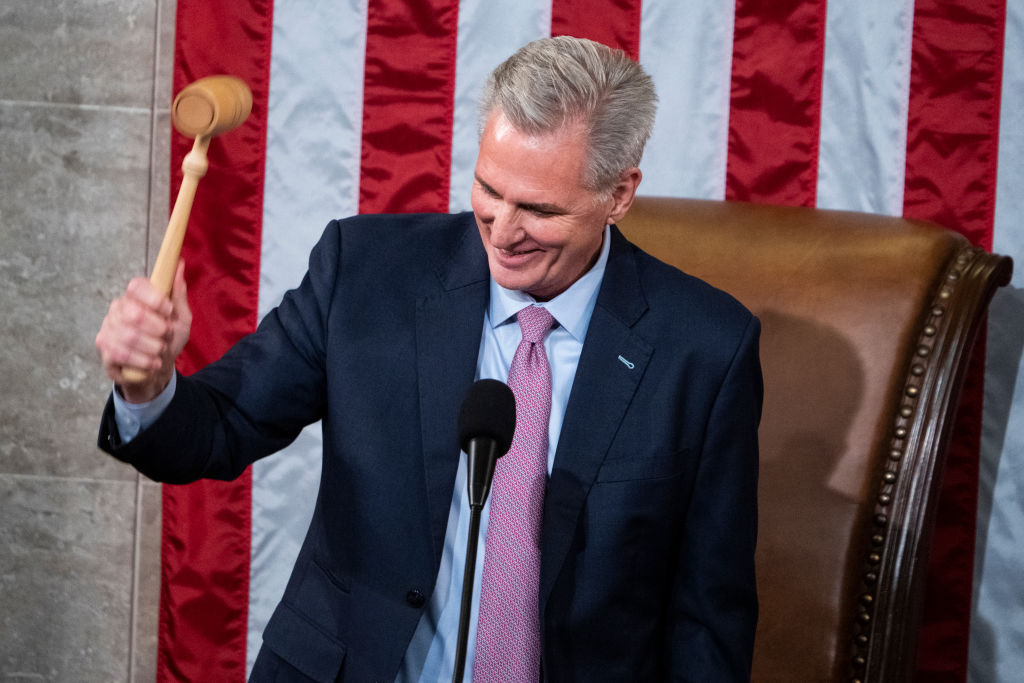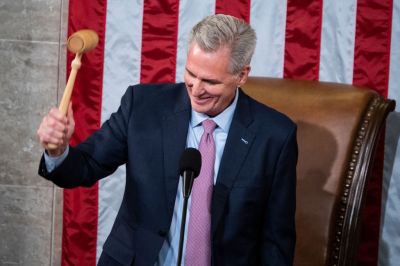On January 2 the anti-establishment Club for Growth issued a “key vote alert.” The notice urged Republican representatives to support a candidate for House speaker who would push for “transformational reforms to the House” and “restore the individual rights and powers of the rank-and-file membership.” The implication was clear: Don’t support Kevin McCarthy’s bid for speaker unless he agrees to a bevy of changes to House rules.
Two days into McCarthy’s protracted battle for the top job in the House, the Club for Growth endorsed his bid. McCarthy had signaled he would consider many of the rules changes and also cut another deal: The Club would support him so long as the McCarthy-aligned Congressional Leadership Fund (CLF) stopped spending in open Republican primaries in “safe” congressional districts or financially support any other groups that choose to do so.
The deal proved pivotal to winning over 20 Republican holdouts, many of whom McCarthy-aligned donors earlier had opposed in GOP primaries. The pledge was also a blatant power play from the Club for Growth, as it could result in more Freedom Caucus-style candidates making it through Republican primaries and into the House—further weakening McCarthy’s hand in future negotiations with his own party.
Discreet Opposition
By the 13th vote for speaker on Friday, most of the 20 McCarthy holdouts had agreed to switch their votes to him. Six of those 14 House members—Mary Miller of Illinois, Andy Ogles of Tennessee, Anna Paulina Luna of Florida, Josh Brecheen of Oklahoma, Dan Bishop of North Carolina, and Chip Roy of Texas—had been endorsed this cycle by the Club for Growth.
The campaign spending concession was “one of three or four issues that they cared about” and “provided relief to members” who’d been targeted by McCarthy-aligned super PACs on the campaign trail, Club for Growth President David McIntosh told The Dispatch on Friday.
Once a strictly libertarian-leaning organization in the Tea Party era, the super PAC Club for Growth Action, like many conservative movement organizations, positioned itself as a MAGA-aligned entity during Donald Trump’s presidency. Since President Joe Biden took office it has distanced itself from the former president but leaned toward figures like Florida Gov. Ron DeSantis, whom it sees as the future of the MAGA movement.
Spending on hardcore anti-establishment candidates has become a fixture of its election strategy. That poses a problem for the newly elected speaker now that there’s an emerging split between the anti-establishment groups that make up the MAGA coalition and the Republican groups aligned with McCarthy, who served as House majority leader under former GOP Speakers John Boehner and Paul Ryan and who has essentially become synonymous with the establishment.
Club leaders hope getting CLF to withdraw from certain Republican primaries will fortify that strategy in 2024 by essentially forcing McCarthy to cede power over next cycle’s electoral landscape in open, Republican-leaning districts.
McCarthy, like many powerful Washington politicians, sits atop a small kingdom of fundraising organizations. One is the Majority Committee, his leadership PAC that in the 2022 midterm election boosted 14 of the 20 representatives who would later oppose his House speakership bid. Another is CLF, a super PAC aimed at winning the House majority. It also spent money in 2022 on behalf of Republicans who would go on to oppose McCarthy’s speakership bid: Keith Self, Andy Harris, and freshman Eli Crane.
But the 2022 primary season is where things get murkier. Earlier on in the midterm cycle, an interconnected web of McCarthy/CLF-aligned super PACs had spent money attacking several Club for Growth-endorsed candidates during their primary campaigns.
Campaign finance loopholes made those PACs’ opposition efforts in the primary elections discreet. Every election cycle, donors pour millions into what are often called “pop-up PACs”—political action committees created just months or even weeks before an election to avoid having to disclose their ties on quarterly Federal Elections Committee reports.
Recent FEC reports now make clear how groups and donors with ties to the newly elected speaker quietly opposed a number of Club-endorsed candidates in their primaries, including freshman representatives Ogles and Luna—two others last week who initially didn’t want to see McCarthy become speaker.
One common denominator is hedge fund manager Kenneth Griffin, a McCarthy ally who donated $6.5 million to CLF in September after spending millions trying to tank several Freedom Caucus-aligned conservatives earlier in the midterm cycle. Griffin’s singularly funded Strong Leaders Fund, for example, bankrolled another super PAC called the Eighteen Fifty-Four Fund, which opposed Luna ahead of her primary via the Stand for Florida PAC.
There’s also the American Prosperity Alliance, a newly incorporated 501(c)4 that spent money opposing Luna and Ogles and whose current treasurer—Parker Hamilton Poling—served as an adviser to McCarthy in the office of former Chief Deputy Whip Patrick McHenry, who is now chairman of the House Financial Services Committee. Poling also served as executive director of the National Republican Congressional Committee during the 2020 cycle.
“Some of these freshmen really felt that CLF and CLF donors had opposed them and spent a lot of money to try to defeat them, so there were raw nerves related to that,” added McIntosh, a former GOP Congressman from Indiana.
It wasn’t just the freshmen members who may have felt slighted by McCarthy-aligned donors. One McCarthy holdout hit especially hard by the GOP leader’s allies during her primary was Freedom Caucus Rep. Mary Miller of Illinois, who came under fire in 2021 for saying at a rally: “If we win a few elections, we’re still going to be losing unless we win the hearts and minds of our children. This is the battle. Hitler was right on one thing. He said, ‘Whoever has the youth has the future.’”
The Strong Leaders Fund spent more than a half-million dollars—and the Eighteen Fifty-Four PAC spent another $625,000—opposing Miller in a post-redistricting, incumbent-on-incumbent primary last year against GOP Rep. Rodney Davis, one of 35 House Republicans to vote for the creation of the bipartisan January 6 Commission. (Club for Growth Action spent $1.7 million boosting Miller.)
Another group that poured a hefty chunk of change into the Eighteen-Fifty Four Fund this cycle was the American Patriots PAC, founded in 2018 by Dan Conston, the current president of CLF. It contributed $1 million in April alone.
Key Vote Alert
Before the voting for speaker began, the Club for Growth had called for members to oppose any candidate who failed to end CLF spending in open and safe House GOP primaries, elect a “true conservative” to House GOP leadership, and allow rank-and-file members to add amendments to any bill brought to the floor. The alert didn’t mention McCarthy.
“We didn't mention any names intentionally because the decision of who to vote for—having been a member myself—members really feel that’s their prerogative, their decision,” McIntosh said. “So they don’t like outside groups telling them who to vote for, who to vote against.”
But the subtext was clear: Vote for McCarthy or the Club will score against you. “At this point, I was saying, I know we would count a yes vote as meeting that criteria,” McIntosh said. “And so a no vote would count against that at this point. And I think Kevin has fulfilled those criteria.”
Rep. Greg Steube, a Club-for-Growth-endorsed Florida member and longtime McCarthy supporter, told The Dispatch that key votes from the Club carry influence with many Republicans. “If the Club were to put out an endorsement for Kevin, and then say that they were going to grade against that—that’s going to be a significant impact, because Club, some board members don’t want their club grades to go down,” Steube said. “If the Club comes out with a press release that says we're endorsing Kevin—and we’re going to grade against a no-vote for him—yeah, that could have significant impacts as well.”
In interviews, some Club-endorsed members who switched their vote to McCarthy dismissed the notion that the CLF deal had swayed their vote.
“That really actually wasn’t one of my talking points or issues, but I think at the end of the day it's a good thing,” Rep. Andy Ogles told The Dispatch Monday evening.
“I haven’t even really read their agreement,” Rep. Chip Roy—who was endorsed by the Club for Growth in 2020—said in an interview Friday shortly after he voted for McCarthy. “I just saw the top level terms of it. I’m glad that they’ve kind of somewhat agreed to say, ‘Hey, we’ll, stay out of that.’ But I don't know. I gotta go read it.”
“My decisions have nothing to do with any of that,” GOP Rep. Josh Brecheen told The Dispatch shortly after he flipped his vote to McCarthy. He said his decision to back McCarthy instead was about restoring fiscal health to America’s budget and ensuring rank-and-file members can add amendments to bills.
One member who opposed McCarthy up until the end, when she voted “present,” said she didn’t trust the terms of the CLF/Club for Growth deal anyway. “I think they’re liars,” GOP Rep. Lauren Boebert said Thursday morning when asked about CLF’s move. (Boebert was endorsed by the Club for Growth in 2020.)
2024
It’s unclear how much of an effect CLF’s concession will have on the next campaign cycle, considering the super PAC “will continue to support incumbents in primaries as well as challengers in districts that affect the Majority, which proved to be critical to winning the Majority in 2022,” per the deal. There’s also no clear definition of what the CLF means by open and “safe” Republican districts.
The most likely scenario is that anti-establishment candidates running in competitive districts next cycle will see a repeat of what happened in North Carolina’s 13th Congressional District last year: In the lead-up to the swing district’s Republican primary in May, the Old North PAC—a fund bankrolled entirely by the Eighteen Fifty-Four Fund—spent more than $1 million in its failed attempt to tank Trump-endorsed candidate Bo Hines, who then lost to a Democrat in the general.
For now, Club-endorsed Republicans are taking what they can get. In McIntosh’s view, the CLF deal does more than just embolden Freedom Caucus-aligned candidates on the campaign trail next cycle: It will also restore trust between McCarthy and the members who almost tanked his speakership.
“When they saw that Club for Growth Action—that’s our super PAC—and CLF were able to reach an understanding,” McIntosh said, “it was like checking one of the items off of the list that they wanted to see before they were comfortable with the current leadership.”
CLF, meanwhile, was clear about what it saw as the benefit of the deal. “We chose to proactively take an issue off the table,” said Conston, the CLF president, when asked about super PACs getting involved in a speakership race. “We felt it was important to engage because our only chance to hold the Majority is with Kevin McCarthy as Speaker.”
Correction Jan 10: This article originally said McCarthy, served as House minority leader under former GOP Speakers John Boehner and Paul Ryan. He served as majority leader under both speakers.







Please note that we at The Dispatch hold ourselves, our work, and our commenters to a higher standard than other places on the internet. We welcome comments that foster genuine debate or discussion—including comments critical of us or our work—but responses that include ad hominem attacks on fellow Dispatch members or are intended to stoke fear and anger may be moderated.
With your membership, you only have the ability to comment on The Morning Dispatch articles. Consider upgrading to join the conversation everywhere.